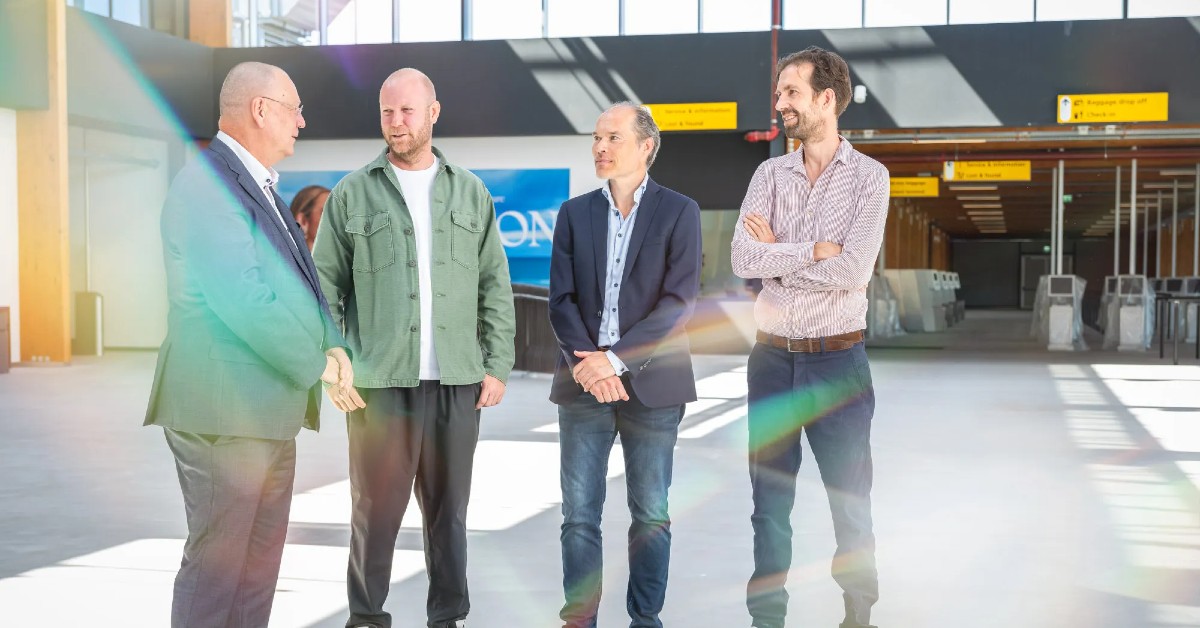Filetransfer scaleup WeTransfer is now a B Corporation. With this certification the Amsterdam based company joins the most ethically and sustainably responsible companies there are. It took some hard work, says WeTransfer CEO Gordon Willoughby. And it’s not just about doing the right thing as he’s sure it’ll pay off in the end.
WeTransfer is now a B Corp
Anyone familiar with WeTransfer might think that becoming a B Corp is a logical step for WeTransfer. As CEO Gordon Willoughby puts it: “We’ve always been purpose driven”. Willoughby took over the role of CEO from Bas Beerens in 2016. At the 10th anniversary of the company, he felt like it was a good idea to aim for certification. “We always put people and creativity ahead of technology. For instance, right from the start we gave 30 percent of our ad space to creative causes. At our anniversary, we were looking forward, thinking of what our company could become. Part of that was becoming a B Corporation; it really appealed to us.”
Companies that are certified B Corporations ‘meet the highest standards of verified social and environmental performance, public transparency, and legal accountability to balance profit and purpose’, according to the website. The aim is to drive private companies to play their part in solving some of society’s most challenging problems. B Corps actively work to reduce inequality, create a healthier environment and have a positive impact. Not just by taking symbolcial steps, but instead by looking at every single aspect of their organization. By getting certified, WeTransfer joins several other responsible startups from Amsterdam such as for instance Fairphone, Impacthub and OnePlanetCrowd.
“For us the certification embeds the purpose in the company. It’s a good rallying point,” says Willoughby. The process forced the company to look at their social responsibility in every aspect of the company. There’s over 200 points a company will be judged upon, and only if it is certain it can easily make 80 percent of it, it should apply for a certification, says Willoughby. Even for a purpose driven company like WeTransfer, this meant some work had to be done first.
Climate goals
Willoughby: “We already donated to good causes. But we never measured its impact. We also tried to buy sustainable whenever possible. But that was just something we did, we never had put it into a policy. So we had to create processes to improve these things.” WeTransfer even enlisted some outside help, to make sure their goals for sustainability would be met. The company pledges to go carbon neutral this year, and wants to reduce CO2 with 30 percent by 2025. So they hired Dutch companies Sustainalize and Climate Neutral Group to assess their situation.
These companies provided a benchmark on an ecological footprint. It turns out that WeTransfer has a carbon footprint comparable to 500 flights from Schiphol to JFK airport in New York every year. Third party services, for instance the Amazon Web Servers the company uses, were greatly responsible for that. But a big part also came from company travel. Not only business trips, but regular commuting played a big role in the impact WeTransfer had on the environment. Willoughby: “Knowing all this made us move a lot quicker towards our goal.”
Doing good is good for business
Willoughby says WeTransfer wanted to get certified because it was the right thing to do. But also because it is good for business. “We’re not a charity and we don’t try to be one. We think our audience will appreciate us doing this and we think people we might want to recruit will appreciate it. It will make people proud to work for WeTransfer and get more passionate and involved. It is an investment and for some companies it will be harder. But in the end our customers will be more loyal, our employees will be more appreciative so it will lower our churn. If you want to be really stuck on the bottom line then I still think it’ll pay off.”

“It will also make us more attractive for new investors,” says Willoughby. Although he admits WeTransfer is not looking for any funding right now. The company raised its series A of €25 million with Highland Capital Partners Europe in 2015. It closed a Series B-funding round of €35 million with HPE Growth not too long ago. It also acquired sketching app Paper and presentation tool Paste from creative developer FiftyThree in 2018. Willoughby: “We have a really good, complete product for the creative market now and this puts us on a really good growth trajectory.”
Impacted by COVID-19
Despite the confidence, The CEO says that the company has been impacted by the COVID-19 pandemic. From mid-March on, Willoughby noticed a slowdown in advertisements ran on the WeTransfer platform, although he claims other ad-firms are probably in worse shape. As one might expect for a company that allows users to send digital files to one another, the usage of the service surged once the world started working from home. Willoughby estimates the increase in free users is about three to four million larger than it would’ve been if COVID-19 didn’t happen. Their SaaS-business, the paid accounts for WeTransfer, is also growing along. The company claims 50 million monthly users and over a billion files sent each month. Since the pandemic hit, the company donated an additional 500 million ad-impressions to artists to showcase their COVID-related work and they offered a free three month trial of their presentation tool Paste Pro.
Stay up-to-date: Read all our COVID-19 coverage here
The pandemic has not only changed WeTransfers business, but as with all companies they had to change the way they work. Willoughby: “We always were quite flexible. Some teams already worked mostly distributed. When we closed the offices on March 13th, we figured it might last for a month. But we didn’t want people to work from their bed or kitchen table, so we gave them an allowance for a good desk and chair at home.” While the offices in Amsterdam and Los Angeles are slowly re-opening, the smaller ones in New York and London remain closed for a bit, Willoughby notices the most important way the pandemic has changed work. “It’s the way we communicate,” says Willoughby.
‘Long term commitment’
He explains that normally WeTransfer would do a company all hands once a month. That has been increased to once a week, since the offices closed. They regularly invite a guest speaker. “Another important way communication has changed, is that it is very important to manage expectations. You really need people to be upfront about what they can and can’t do when working from home. You want people to be able to tell a Slack-channel ‘hey guys, I’m looking after a two year old for a couple of hours’. That’s way better than just becoming less responsive to your colleagues.”
Willoughby does see the bright side of the new working situation. “In the longer term this will make us more distributed and flexible. That means we can also look in a wider pool of talent.” And working from home has another advantage for a B Corporation, looking to slash its carbon footprint. Less commutes mean less pollution from travel. Willoughby: “We’ve reached this milestone now, by achieving the certification. But it’s a long term commitment. We have to get recertified in two and a half years and from what I heard from other companies, this is a lot harder than the initial certification.”
This article is produced in a collaboration with StartupAmsterdam. Read more about our partnering opportunities.










01
From telecom veteran to Dutch Startup Visa success: The Jignesh Dave story